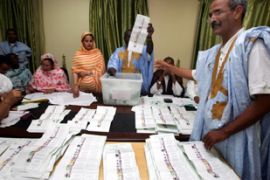Mauritania poll set for run-off
The election aims to establish a civilian democracy in the former French colony.

Ahmed Ould Daddah opposed ran unsuccessfully against Ould Sid’Ahmed Taya in 1992 and 2003.
Other presidential candidates include a former military ruler, an ex-central bank governor and a descendant of black slaves.
If no candidate wins more than 50 per cent, a second round will be held on March 25 to decide between the two frontrunners.
Good turnout
Counting began almost as soon as polling stations closed in the dusty capital Nouakchott and oasis towns in the desert.
| “Mauritania really can serve as an example for the rest of Africa. Only 19 months after a coup, you have all the stages of democracy. It’s too good to be true, but it’s happening”
Vijay Makhan, special envoy for the African Union |
“We have a full ballot box … there was a good turnout,” Mohamed Vadel Cheikh Saadbouh, president of polling station Number 2 in Nouakchott’s Tevragh Zeina neighbourhood, told Reuters news agency.
“It has gone well, in a calm atmosphere … Procedures were respected,” Marie Anne Isler Beguin, head of the European Union observer mission, said. No major incidents were reported.
Members of the outgoing military junta which took power in a bloodless 2005 coup had barred themselves from standing as candidates, making Sunday’s polls Mauritania‘s freest and most open, election officials and observers said.
“We’ve never had an election like this before. We hope it will change a lot in the country, God willing,” Ahmed Ould Brahim, 46, an unemployed mason, said as he voted near Nouakchott‘s Keube shantytown, a dusty maze of ramshackle huts.
“We want education and work, less corruption and tribalism.”
Success story
The election, following multi-party legislative polls late last year, completes a promised handover to civilian rule by the junta headed by Colonel Ely Ould Mohamed Vall.
“We’ve fulfilled our commitment and now it’s time to go,” Vall, a tall, soft-spoken officer in his 50s with a moustache and spectacles, told reporters as he voted.
 |
| Vall, who led a bloodless coup in 2005, barred members of the junta from standing [EPA] |
Mauritania‘s mostly nomadic population of three million is a mix of white and black Moors and black African Mauritanians.
“We are Bedouin, but the world is changing and we must adjust too,” said Fatma Shriva, 45, who walked across sand dunes to cast her ballot at the oasis of Etkemkemet, northeast of Nouakchott, her pale blue veil and robe fluttering in the wind.
Observers hailed the handover as a success story for Africa.
“Mauritania really can serve as an example for the rest of Africa. Only 19 months after a coup, you have all the stages of democracy. It’s too good to be true, but it’s happening,” Vijay Makhan, special envoy for the African Union, told reporters.
Many voters said they wanted the new president, who will serve five years, to ensure that Mauritania‘s natural wealth was distributed more fairly, and to end racial inequality.
“We have everything in our country, fisheries, oil and mining. What we want is good government,” said Diatahir Mamadou, 47, an unemployed driver. “And we want no more racism.”
Black Mauritanians complain of discrimination and slavery under a centuries-old system that has favoured the white Moorish elite who have traditionally held power.
Slavery was legally banned in 1981 but rights groups say it still exists in parts of Mauritania.